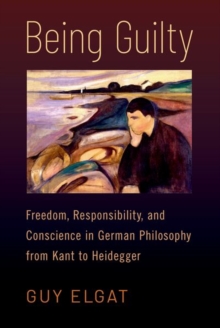Description
| Product ID: | 9780197605561 |
| Product Form: | Hardback |
| Country of Manufacture: | US |
| Title: | Being Guilty |
| Subtitle: | Freedom, Responsibility, and Conscience in German Philosophy from Kant to Heidegger |
| Authors: | Author: Guy Elgat |
| Page Count: | 336 |
| Subjects: | Philosophy: epistemology and theory of knowledge, Philosophy: epistemology & theory of knowledge, Ethics and moral philosophy, Social and political philosophy, Ethics & moral philosophy, Social & political philosophy |
| Description: | Being Guilty examines the thought of six central German philosophers--Kant, Schelling, Schopenhauer, Paul Rée, Nietzsche, and Heidegger--on the phenomenon of guilt, or the painful sting of bad conscience suffered when we perform a wrong action. The work also examines these philosophers'' views on responsibility, freedom, and conscience. It concludes with the novel argument that the thought of Heidegger provides a synthesis of the insights of the previous philosophers and overcomes their deficiencies. Through Heidegger and his predecessors, the author articulates a new theoretical approach to guilt. What can guilt, the painful sting of the bad conscience, tell us about who we are as human beings? How can it be explained or justified? Being Guilty seeks to answer these questions through an examination of the views of Kant, Schelling, Schopenhauer, Paul Rée, Nietzsche, and Heidegger on guilt, freedom, responsibility, and conscience.The concept of guilt has not received sufficient attention from scholars working in the history of German philosophy. What''s more, even individual thinkers whose conceptions of guilt have been researched have not been studied fully within their historical contexts. Guy Elgat redresses both these scholarly lacunae to show how these philosophers'' arguments can be more deeply grasped once read in their historical context, a history that should be read as proceeding dialectically. Thus, in Kant, Schelling, and Schopenhauer, we find variations on the idea that guilt for specific actions we perform is justified because the human agent is guilty in his very being--a guilt for which he is responsible. In contrast, in Rée and Nietzsche, these ideas are rejected and guilt is seen as rarely justified but rather explainable through human psychology. Finally, in Heidegger, we find a near synthesis of the views of the previous philosophers, as he argues we are guilty in our very being yet are not responsible for this guilt. In the process of unfolding the trajectory of these evolving conceptions of guilt, the philosophers'' views on these and many other issues are explored in depth, and through them Elgat articulates an entirely new approach to guilt. |
| Imprint Name: | Oxford University Press Inc |
| Publisher Name: | Oxford University Press Inc |
| Country of Publication: | GB |
| Publishing Date: | 2022-04-27 |
